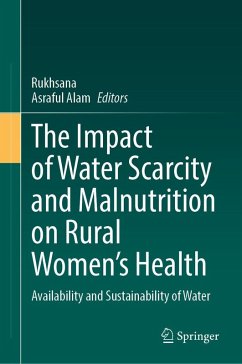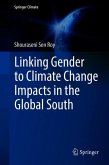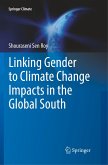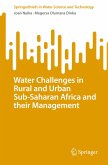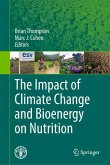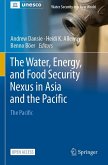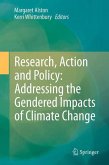The Impact of Water Scarcity and Malnutrition on Rural Women's Health
Availability and Sustainability of Water
Herausgegeben:Rukhsana; Alam, Asraful
The Impact of Water Scarcity and Malnutrition on Rural Women's Health
Availability and Sustainability of Water
Herausgegeben:Rukhsana; Alam, Asraful
- Gebundenes Buch
- Merkliste
- Auf die Merkliste
- Bewerten Bewerten
- Teilen
- Produkt teilen
- Produkterinnerung
- Produkterinnerung
This edited volume scrutinizes how economic, socio-cultural, and political-normative systems govern the reach of water among rural women living in extreme poverty. It offers local, regional, and global perspectives on water and agricultural sustainability, and uses innovative methodological approaches focusing on assessing the essential components of water security, food security, gender development, and health management. The book provides a comprehensive overview of key aspects of water and gender development, socio-economics, and food security, including definitional and conceptual issues,…mehr
Andere Kunden interessierten sich auch für
![Linking Gender to Climate Change Impacts in the Global South Linking Gender to Climate Change Impacts in the Global South]() Shouraseni Sen RoyLinking Gender to Climate Change Impacts in the Global South83,99 €
Shouraseni Sen RoyLinking Gender to Climate Change Impacts in the Global South83,99 €![Linking Gender to Climate Change Impacts in the Global South Linking Gender to Climate Change Impacts in the Global South]() Shouraseni Sen RoyLinking Gender to Climate Change Impacts in the Global South83,99 €
Shouraseni Sen RoyLinking Gender to Climate Change Impacts in the Global South83,99 €![Water Challenges in Rural and Urban Sub-Saharan Africa and their Management Water Challenges in Rural and Urban Sub-Saharan Africa and their Management]() Joan NyikaWater Challenges in Rural and Urban Sub-Saharan Africa and their Management34,99 €
Joan NyikaWater Challenges in Rural and Urban Sub-Saharan Africa and their Management34,99 €![The Impact of Climate Change and Bioenergy on Nutrition The Impact of Climate Change and Bioenergy on Nutrition]() The Impact of Climate Change and Bioenergy on Nutrition76,99 €
The Impact of Climate Change and Bioenergy on Nutrition76,99 €![The Water, Energy, and Food Security Nexus in Asia and the Pacific The Water, Energy, and Food Security Nexus in Asia and the Pacific]() The Water, Energy, and Food Security Nexus in Asia and the Pacific31,99 €
The Water, Energy, and Food Security Nexus in Asia and the Pacific31,99 €![Research, Action and Policy: Addressing the Gendered Impacts of Climate Change Research, Action and Policy: Addressing the Gendered Impacts of Climate Change]() Research, Action and Policy: Addressing the Gendered Impacts of Climate Change76,99 €
Research, Action and Policy: Addressing the Gendered Impacts of Climate Change76,99 €![Surface- and Groundwater Quality Changes in Periods of Water Scarcity Surface- and Groundwater Quality Changes in Periods of Water Scarcity]() Milos GregorSurface- and Groundwater Quality Changes in Periods of Water Scarcity76,99 €
Milos GregorSurface- and Groundwater Quality Changes in Periods of Water Scarcity76,99 €-
-
-
This edited volume scrutinizes how economic, socio-cultural, and political-normative systems govern the reach of water among rural women living in extreme poverty. It offers local, regional, and global perspectives on water and agricultural sustainability, and uses innovative methodological approaches focusing on assessing the essential components of water security, food security, gender development, and health management. The book provides a comprehensive overview of key aspects of water and gender development, socio-economics, and food security, including definitional and conceptual issues, information systems and data sources, indicators, and policies. It is intended to be an informative resource for students, researchers, and professionals working in water sustainability, rural resource economics, and agricultural development.
Produktdetails
- Produktdetails
- Verlag: Springer, Berlin; Springer
- Artikelnr. des Verlages: 89522896
- Erscheinungstermin: 24. Januar 2026
- Englisch
- Abmessung: 235mm x 155mm
- ISBN-13: 9783032108869
- ISBN-10: 3032108861
- Artikelnr.: 75589372
- Herstellerkennzeichnung
- Springer-Verlag GmbH
- Tiergartenstr. 17
- 69121 Heidelberg
- ProductSafety@springernature.com
- Verlag: Springer, Berlin; Springer
- Artikelnr. des Verlages: 89522896
- Erscheinungstermin: 24. Januar 2026
- Englisch
- Abmessung: 235mm x 155mm
- ISBN-13: 9783032108869
- ISBN-10: 3032108861
- Artikelnr.: 75589372
- Herstellerkennzeichnung
- Springer-Verlag GmbH
- Tiergartenstr. 17
- 69121 Heidelberg
- ProductSafety@springernature.com
Dr. Rukhsana is an Associate Professor in the Department of Geography at Aliah University, Kolkata. She done her M.A. and Ph.D. in Geography from Aligarh Muslim University, Aligarh. Her administrative roles at Aliah University include serving as the former Head of the Geography Department and Superintendent of Aliah Girls' Hostel. She was awarded seven academic awards and fellowships including the International Young Geographer Award 2009, the AMU-JRF Award 2006, and UGC-RF 2007-2009 award, etc. Dr. Rukhsana completed three Major Research projects sponsored by ICSSR, the Ministry of Education, and New Delhi. She has supervised six scholars leading to award Ph.D degrees. She has published more than 56 research papers in reputed journals and 32 chapters in edited books. Dr Rukhsana has published 10 edited books and 3 authored in Springer and CRC Taylor Francis etc. Her international experience includes attending the XXV FIG International Congress (2014) in Malaysia and ICGGS (2018) in Bangkok, Thailand. She has also served editorial board member, academic editor and associate editor for various journals and actively engaged in various professional activities and contributed significantly to the university in administrative capacities. She is serving as a Steering Committee Member of the IGU C24.02 Agricultural Geography and Land Engineering, Department of Geography, University of Istanbul, ¿.Ü. Edebiyat Fakültesi Cörafya Bölümü, Ordu Cd. No:196 Laleli – ¿stanbul, Turkey. Dr. Asraful Alam is Assistant Professor and Head in the Department of Geography at Serampore Girls’ College, University of Calcutta. He completed his M.A. in Geography from Aligarh Muslim University, Ph.D. from Aliah University, and Postdoctoral Research at the University of Calcutta. He also holds a PG Diploma in Remote Sensing and GIS. His teaching and research interests include population and health geography, agricultural geography, climatology, sustainable development, and geospatial science. Dr. Alam has authored, co-authored, and edited 11 books, including volumes with Springer and Taylor & Francis, and published more than 50 research papers in leading journals such as Springer, Elsevier, Wiley, and Nature. He has presented over 60 papers at national and international conferences in India and abroad. He has directed ICSSR-funded projects and contributed to studies on disaster resilience, water management, and rural development. He serves as a Steering Committee Member (2024–2028) of the IGU Commission on Health and the Environment, and as an editorial board member/reviewer for journals including PLOS ONE, GeoJournal (Springer), and BMC Public Health. A life member of the Geographical Society of India and the Regional Science Association, Dr. Alam has also been invited as a resource person and session chair at various academic events.
1 Effect of Water Crisis on Rural Women: A Review of Indian Perspectives.-
2 Overview of the Water Crisis and Malnutrition of the Rural Women at the
Global Level.- 3 Water Crises and Vulnerabilities in the Indian Sundarbans:
Women’s Perspective on Socio-Demographic and Climate Resilience.- 4
Gendered Dimensions of Water Security and Food Supply: Examining Women's
Health and Leadership in Gangani Census Mouza, West Bengal.- 5 The Silent
Crisis: Water Shortage and Its Role in Poverty and Malnutrition among Rural
Women in Ahirpurwa.- 6 Water, Sanitation, and Hygiene Challenges for
Marginalised Communities of India: An Anthropological Study.- 7 Surviving
and Thriving: Freshwater Scarcity and its Challenges among Lodha Women in
the Gosaba Block, Sundarbans.- 8 Water Insecurity and Women’s Health:
Unveiling the Hidden Burden in Rural Households.- 9 Tackling Rural Water
Scarcity through Dam-Based Solutions: A Study of Maithon Dam's Role in West
Burdwan.- 10 Water Scarcity, Hygiene, and Dropouts: Media’s Role in
Overcoming Puberty Barriers for Indian Schoolgirls.- 11 Factors Influencing
Tap vs. Bottled Water Consumption: A Study of Consumer Behaviour in
Siliguri Municipal Corporation.- 12 Climate Change and Women's Health:
Understanding Heat Vulnerability in Hilly Urban Centers of the Earth.- 13
Unlocking SDG-6: Accelerating WASH for Health and Equity in Developing
Countries - A Comprehensive Systematic Review with a Focus on India.- 14
The Role of Tribal Women in Jharkhand in Promoting Sustainable Development
Through Traditional Water Resource Conservation Practices.- 15 India and
Sustainable Development Goals: An Overview of India’s Performance on SDGs
Indicators.- 16 Understanding Fish Culture: Role of Statistical Remote
Sensing in Analysing Rural Pond Water Quality Parameters.- 17 Disaster
Risks and Women’s Health: Water and Sanitation Challenges in Flood-Prone
Nirmal Char, Murshidabad.
2 Overview of the Water Crisis and Malnutrition of the Rural Women at the
Global Level.- 3 Water Crises and Vulnerabilities in the Indian Sundarbans:
Women’s Perspective on Socio-Demographic and Climate Resilience.- 4
Gendered Dimensions of Water Security and Food Supply: Examining Women's
Health and Leadership in Gangani Census Mouza, West Bengal.- 5 The Silent
Crisis: Water Shortage and Its Role in Poverty and Malnutrition among Rural
Women in Ahirpurwa.- 6 Water, Sanitation, and Hygiene Challenges for
Marginalised Communities of India: An Anthropological Study.- 7 Surviving
and Thriving: Freshwater Scarcity and its Challenges among Lodha Women in
the Gosaba Block, Sundarbans.- 8 Water Insecurity and Women’s Health:
Unveiling the Hidden Burden in Rural Households.- 9 Tackling Rural Water
Scarcity through Dam-Based Solutions: A Study of Maithon Dam's Role in West
Burdwan.- 10 Water Scarcity, Hygiene, and Dropouts: Media’s Role in
Overcoming Puberty Barriers for Indian Schoolgirls.- 11 Factors Influencing
Tap vs. Bottled Water Consumption: A Study of Consumer Behaviour in
Siliguri Municipal Corporation.- 12 Climate Change and Women's Health:
Understanding Heat Vulnerability in Hilly Urban Centers of the Earth.- 13
Unlocking SDG-6: Accelerating WASH for Health and Equity in Developing
Countries - A Comprehensive Systematic Review with a Focus on India.- 14
The Role of Tribal Women in Jharkhand in Promoting Sustainable Development
Through Traditional Water Resource Conservation Practices.- 15 India and
Sustainable Development Goals: An Overview of India’s Performance on SDGs
Indicators.- 16 Understanding Fish Culture: Role of Statistical Remote
Sensing in Analysing Rural Pond Water Quality Parameters.- 17 Disaster
Risks and Women’s Health: Water and Sanitation Challenges in Flood-Prone
Nirmal Char, Murshidabad.
1 Effect of Water Crisis on Rural Women: A Review of Indian Perspectives.-
2 Overview of the Water Crisis and Malnutrition of the Rural Women at the
Global Level.- 3 Water Crises and Vulnerabilities in the Indian Sundarbans:
Women’s Perspective on Socio-Demographic and Climate Resilience.- 4
Gendered Dimensions of Water Security and Food Supply: Examining Women's
Health and Leadership in Gangani Census Mouza, West Bengal.- 5 The Silent
Crisis: Water Shortage and Its Role in Poverty and Malnutrition among Rural
Women in Ahirpurwa.- 6 Water, Sanitation, and Hygiene Challenges for
Marginalised Communities of India: An Anthropological Study.- 7 Surviving
and Thriving: Freshwater Scarcity and its Challenges among Lodha Women in
the Gosaba Block, Sundarbans.- 8 Water Insecurity and Women’s Health:
Unveiling the Hidden Burden in Rural Households.- 9 Tackling Rural Water
Scarcity through Dam-Based Solutions: A Study of Maithon Dam's Role in West
Burdwan.- 10 Water Scarcity, Hygiene, and Dropouts: Media’s Role in
Overcoming Puberty Barriers for Indian Schoolgirls.- 11 Factors Influencing
Tap vs. Bottled Water Consumption: A Study of Consumer Behaviour in
Siliguri Municipal Corporation.- 12 Climate Change and Women's Health:
Understanding Heat Vulnerability in Hilly Urban Centers of the Earth.- 13
Unlocking SDG-6: Accelerating WASH for Health and Equity in Developing
Countries - A Comprehensive Systematic Review with a Focus on India.- 14
The Role of Tribal Women in Jharkhand in Promoting Sustainable Development
Through Traditional Water Resource Conservation Practices.- 15 India and
Sustainable Development Goals: An Overview of India’s Performance on SDGs
Indicators.- 16 Understanding Fish Culture: Role of Statistical Remote
Sensing in Analysing Rural Pond Water Quality Parameters.- 17 Disaster
Risks and Women’s Health: Water and Sanitation Challenges in Flood-Prone
Nirmal Char, Murshidabad.
2 Overview of the Water Crisis and Malnutrition of the Rural Women at the
Global Level.- 3 Water Crises and Vulnerabilities in the Indian Sundarbans:
Women’s Perspective on Socio-Demographic and Climate Resilience.- 4
Gendered Dimensions of Water Security and Food Supply: Examining Women's
Health and Leadership in Gangani Census Mouza, West Bengal.- 5 The Silent
Crisis: Water Shortage and Its Role in Poverty and Malnutrition among Rural
Women in Ahirpurwa.- 6 Water, Sanitation, and Hygiene Challenges for
Marginalised Communities of India: An Anthropological Study.- 7 Surviving
and Thriving: Freshwater Scarcity and its Challenges among Lodha Women in
the Gosaba Block, Sundarbans.- 8 Water Insecurity and Women’s Health:
Unveiling the Hidden Burden in Rural Households.- 9 Tackling Rural Water
Scarcity through Dam-Based Solutions: A Study of Maithon Dam's Role in West
Burdwan.- 10 Water Scarcity, Hygiene, and Dropouts: Media’s Role in
Overcoming Puberty Barriers for Indian Schoolgirls.- 11 Factors Influencing
Tap vs. Bottled Water Consumption: A Study of Consumer Behaviour in
Siliguri Municipal Corporation.- 12 Climate Change and Women's Health:
Understanding Heat Vulnerability in Hilly Urban Centers of the Earth.- 13
Unlocking SDG-6: Accelerating WASH for Health and Equity in Developing
Countries - A Comprehensive Systematic Review with a Focus on India.- 14
The Role of Tribal Women in Jharkhand in Promoting Sustainable Development
Through Traditional Water Resource Conservation Practices.- 15 India and
Sustainable Development Goals: An Overview of India’s Performance on SDGs
Indicators.- 16 Understanding Fish Culture: Role of Statistical Remote
Sensing in Analysing Rural Pond Water Quality Parameters.- 17 Disaster
Risks and Women’s Health: Water and Sanitation Challenges in Flood-Prone
Nirmal Char, Murshidabad.

